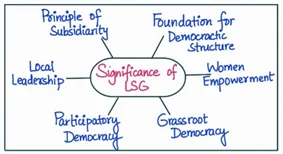Answer:
| Approach:
Introduction
- Briefly introduce the concept of local self-government system in India, and mention the 73rd and 74th Constitutional Amendments.
Body
- Talk about the positive aspects of the local self-government system.
- Identify and mention the challenges faced by the local self-government system.
- Also, mention the recommendations of the Second ARC.
- Provide suggestions to improve the situation.
Conclusion
- Write a suitable conclusion.
|
Introduction:
The local self-government system in India, including Panchayati Raj Institutions and Urban Local Bodies, was established to promote participatory democracy, decentralized governance, and address local concerns. Despite the 73rd and 74th Constitutional Amendments providing a legal framework, the effectiveness of these institutions in governance continues to be debated.

Body:
Effectiveness of local self-government system:
- Decentralization of power: For instance, Kerala’s People’s Plan Campaign witnessed a significant level of public participation in local governance.
- Social Justice: Reservation of seats for women, Scheduled Castes (SC), and Scheduled Tribes (ST) has led to better representation and inclusivity in local governance.
However, the local self-government system has faced various challenges like:
- Insufficient devolution of powers: In many instances, state governments have been reluctant to delegate authority, leaving PRIs and ULBs with inadequate powers and functions.
- The 2nd ARC recommended that state governments must devolve a significant amount of power and authority to Panchayati Raj Institutions (PRIs) and Urban Local Bodies (ULBs). This includes power over financial resources, administrative control, and decision-making authority in local matters. The ARC suggested implementing Activity Mapping, wherein powers and responsibilities are clearly delineated across different levels of government (centre, state, and local).
- Financial constraints: For example, in Bihar, local bodies have struggled to generate enough revenue to provide basic amenities like sanitation and drinking water.
- The 2nd ARC emphasized the need for financial autonomy for local bodies. It recommended the establishment of State Finance Commissions in all states, which should be mandated to determine the taxes, duties, tolls, and fees that may be assigned to, or appropriated by, the local bodies. It also stressed the need for improving the local bodies’ capacity to generate revenue and manage finances effectively.
- Political interference: This undermines their autonomy and results in a lack of accountability and transparency in decision-making.
- Capacity constraints: Local bodies often lack the necessary human resources and technical expertise to effectively plan and implement development projects.
Suggestions to improve the situation:
- Strengthening devolution of powers: State governments must devolve more powers and functions to local bodies, allowing them to function as effective instruments of governance.
- Financial empowerment: The central and state governments should ensure adequate fiscal transfers to local bodies and enable them to tap additional sources of revenue.
- Training and capacity building: To enhance the efficiency of local self-government institutions, regular training and capacity-building programs should be organized for elected representatives and officials, equipping them with the necessary skills and knowledge.
- Accountability and transparency: Measures like social audits, citizen report cards, and e-governance initiatives should be encouraged to promote transparency and accountability in the functioning of local bodies.
Conclusion:
By addressing the challenges and implementing the suggested measures, the system can be strengthened, enabling it to deliver better governance and development outcomes for the people of India.
